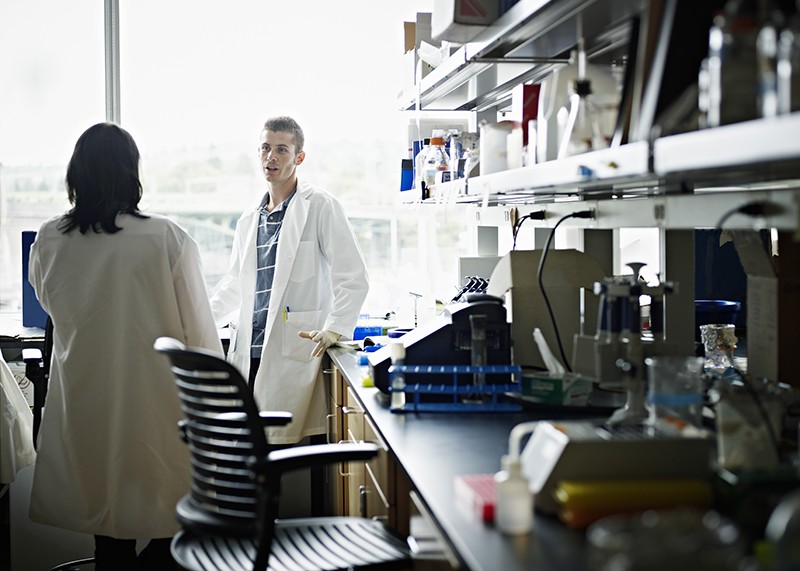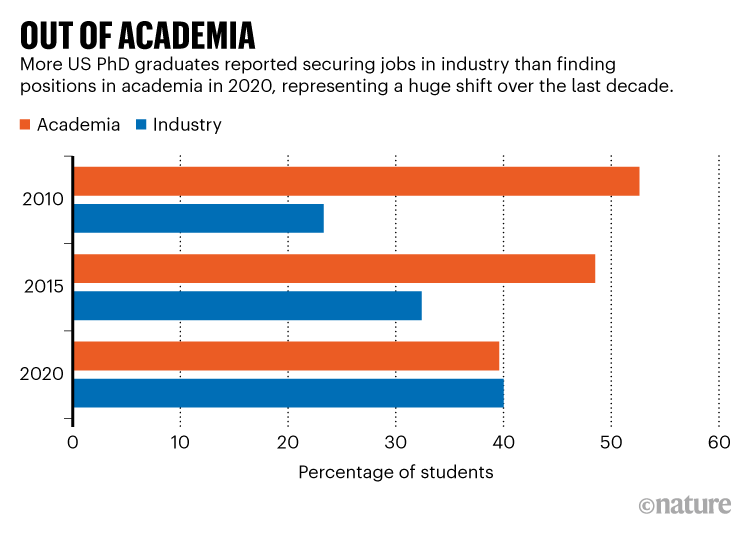Although many PhD students are aware of the limited job prospects in academia, few have the resources or support they need to pursue non-academic careers. In 2020, only 10% of engineering PhD graduates and 16% of those in physical and earth sciences ended up in academic positions in the United States, according to the National Science Foundation Survey of Earned Doctorates.
And, according to the 2019 Nature survey of PhD students (see Nature 575, 403–406; 2019), only 26% of this group said their programme had prepared them ‘very well’ for a satisfying career. Nature will rerun the survey later this year.
Laboratory leaders are uniquely positioned to help their graduate students to learn about non-academic career opportunities and gain experiences outside of the laboratory to make them competitive for these jobs. Four scientists share advice about what principal investigators (PIs) can do to support students who are interested in non-academic careers.
ANNE KROOK: Voice your support for alternative paths
Founder and principal of Practical Workplace Advice in Seattle, Washington.
PIs need to have career-centred conversations with their students from the first minute they start in the lab and repeatedly throughout their programmes. Doing anything else is dishonest: once you look at placement numbers, it is completely clear that most graduate students and postdocs are not going to get faculty positions.
I ended up leaving academia after I didn’t get tenure. I moved to Seattle, Washington, where I bartended for a year before getting a job at Amazon. I worked there for 13 years and held many roles, most recently director of infrastructure. It was an incredibly demanding and lively intellectual environment. Now, I give practical workplace advice to graduate students as part of my business, which I started in 2014.
I teach graduate students and postdocs about how to enter the non-academic job market. I also give talks on negotiating compensation and how women can manage difficult workplace interactions outside academia.
Although PIs often don’t have intimate knowledge of careers outside academia, they are uniquely positioned to give permission to, or even encourage, their lab members to pursue non-academic careers. Some PhD students and postdocs might think that their PIs don’t know or care about non-academic careers (see ‘Do-It-Yourself Careers Guidance’). But if a PI says out loud that those jobs are OK to pursue, an early-career scientist in their lab might feel that they can go forward with those searches. At least once per year, PIs can tell everyone in their lab, “I know many of you are not going to get another job in academia, and that’s OK. I want you to know that I support you in your search for that job, and I will do everything I can to help you.”
Instead, graduate students and postdocs continually tell me that they’re afraid to say they’re looking for such jobs, although everyone knows what the employment statistics are for academic positions. Lab leaders should also give their those they advise time to work with career-services teams at their institution, go to a CV-writing workshop and attend recruiting events.
Another thing PIs can do is organize a team video call every month with three people who have gone to work outside academia. Ask them to describe what they do, what the hardest problem they have to solve is, what they learnt in graduate school or as a postdoc that was helpful and what they wish they had learnt. Doing this will introduce students and postdocs to people in different fields and positions and will demystify leaving the academic world.
INGA CONTI-JERPE: Give students time to explore
Scientific development lead for isoFoodtrace in San Francisco, California.
During both my master’s and PhD programmes, I was never completely committed to staying on the academic career track. I got my PhD in marine biology from the University of Hong Kong, where I used stable-isotope analysis to study coral-reef ecology. Now, I use this tool at my company isoFoodtrace, based in Hong Kong, which validates food labels and verifies, for example, whether a food item is organic or whether seafood is farmed or wild-caught.
I had never considered starting my own company before, but my business partner Colin Luk was the catalyst. We were in the same PhD programme and sat next to each other for four years. He had opened a cafe and bar in Hong Kong before pursuing his PhD, so he had a lot of experience in the food and beverage industry. Colin had the experience and mindset to look at the work I was doing from a non-academic perspective.
David Baker, a marine biologist and my PhD adviser, supported me in starting my own business. He’s very aware of the academic job situation and is open about wanting to help his students to prepare for whatever careers they want to pursue. Although his attitude was great, he couldn’t give me unlimited advice on leaving academia — because he’d never done it himself. However, after I left the lab at the conclusion of my postdoc contract in December 2020, he started his own business, so now he has experience that he can draw on to guide his students who are interested in starting their own businesses in the future.
It’s crucial for PIs and universities to expose graduate students to people with non-academic careers so students can learn about other options, hear different perspectives and grow their networks. Building connections between early-career researchers and people outside academia is the most important thing that universities can facilitate. Graduate students already have transferable skills, but the way to get a job is often by knowing somebody who knows somebody.
PIs and universities should also let graduate students and postdocs do internships and explore different career options. One opportunity that I’m extremely grateful for was working on a consulting project for the airport authority of Hong Kong during my PhD programme. The airport authority wanted to transplant more than 500 colonies of the soft coral Guaiagorgia spp. that were present on the existing airport seawall, to minimize the environmental impact of building a third runway. We tested the feasibility of transplanting these corals, which involved severing them from their attachment point and reattaching them to new substrates at a suitable site. Then, we transplanted the coral colonies at the airport.
That was the first time I worked on something where I had to care about not just the science, but also what the clients wanted. It gave me practice in thinking about project goals and outcomes, and it helped me to work out what I liked and didn’t like. It’s hard to find out what career you might want to pursue if you’ve never tried it.
EDUARDO SANTOS: Ask students about their career interests and goals
Data science senior analyst at Santander Brasil in São Paulo, Brazil.
I’m an example of a scientist who moved from academia to industry: in May 2021, I left my lecturer position at the University of São Paulo, Brazil, and became a data analyst at a bank. My skills in data analysis and project management are well suited to the business world, and I still apply the scientific method in my job.
Before making this transition, I had conversations with my students about the standard academic career path, in which the goal is to obtain a faculty position and get tenure.
In my case, I got tenure at a good university, and then I voluntarily left to pursue this role. My students wanted to know what was going on and why, so we’ve had long chats about what drove me to change my mind and ultimately to change careers.
Before leaving academia, I had very sincere talks with junior members and interns in my lab about what kind of research they wanted to do, where they wanted to be in five years, what they could expect in terms of academic career prospects and why they needed to think deeply about their career paths. I tried to have those conversations periodically to find out whether their interests or career goals had changed.
Some of my students were hesitant about pursuing academic careers, so I made sure that they knew what they were getting into. I told them how few academic jobs are available, instead of just focusing on the romantic aspects of doing research. I’ve had several difficult conversations with students about their future prospects in academia (see ‘Out of Academia’). Often, they’re grateful we had those sincere talks because it helped them to pursue the right career paths.
One student, who was pursuing a master’s degree, told me she wasn’t planning on continuing research after finishing her programme. She told me that she loved baking. I told her that if baking makes her happy and she thinks she has a career option down that road, then go for it. She took a job at a bakery during her programme and realized she didn’t like it. Now, she’s finishing her dissertation and looking for jobs in data science. It’s great that she took the time to explore and work out what she wants to do.
Young researchers often feel obliged to end up in academia, and can feel like a failure if they don’t. It’s important to change that perspective. There are many careers outside academic research where scientists can succeed. I tried to emphasize that graduate students and postdocs develop a range of skills that they will carry forwards for the rest of their lives. The most important thing that PIs can do is listen to young researchers. Ask them what they want to do, why they want to follow a certain career path, what kinds of skills they want to develop, what their strengths are and what they’d like to improve. I always tried to understand their points of view and then gently offered advice when I could.
REGINA BAUCOM: Devise a mentoring plan to help your students
Ecology and evolutionary biologist at the University of Michigan in Ann Arbor.
If lab leaders look at the people they train as a commodity, then they can get stuck in this idea that their students can go only into academia. But if PIs look at people as individuals who are going to do wonderful things, regardless of whether they go into tenure-track positions or not, then they can divorce themselves from the other mindset. To me, the end goal is to get someone to where they want to go by training them to be an excellent scientist.
I start having conversations with students about their career paths during recruitment. I want to get a sense of what they’re thinking and what they want to do, whether it’s research, teaching, outreach, working at a non-governmental organization or something else. When a student joins my lab, we devise a mentoring plan and talk about it at least once per year. The plan asks each student about what they’ve accomplished in the past year, what they were most proud of and how they’re feeling about the progress they’ve made. It also includes questions about what support and resources they’ll need moving forwards and what they want to accomplish in the future.
I emphasize that, during a graduate programme, they will be doing science and will be trained as a scientist. Then, once their first paper is done and they’re moving forwards on their second and third papers, we’ll start looking for opportunities that will support their career interests. I like focusing on career opportunities during the later stages of their graduate programmes because students in early stages have to prioritize their time, so they don’t burn out from taking on too much too soon.
For instance, if a student is interested in science outreach, I’ll help connect them with employees at local museums. One of my students decided to take extra statistics courses and a course in geographic information system mapping. She graduated in 2020 with a PhD in ecology and evolutionary biology and a certificate in data science. Now, she is working as a data analyst and postdoc. I feel that, in academia, we should always be supporting students in improving their knowledge base and skills. I also connect students with people in my network who have non-academic careers, such as in industry or environmental law, to expose them to different paths and help them to expand their networks.
"can" - Google News
January 24, 2022 at 06:07PM
https://ift.tt/3KGPJ7l
How lab leaders can support students' non-academic career plans - Nature.com
"can" - Google News
https://ift.tt/2NE2i6G
https://ift.tt/3d3vX4n
Bagikan Berita Ini





















0 Response to "How lab leaders can support students' non-academic career plans - Nature.com"
Post a Comment